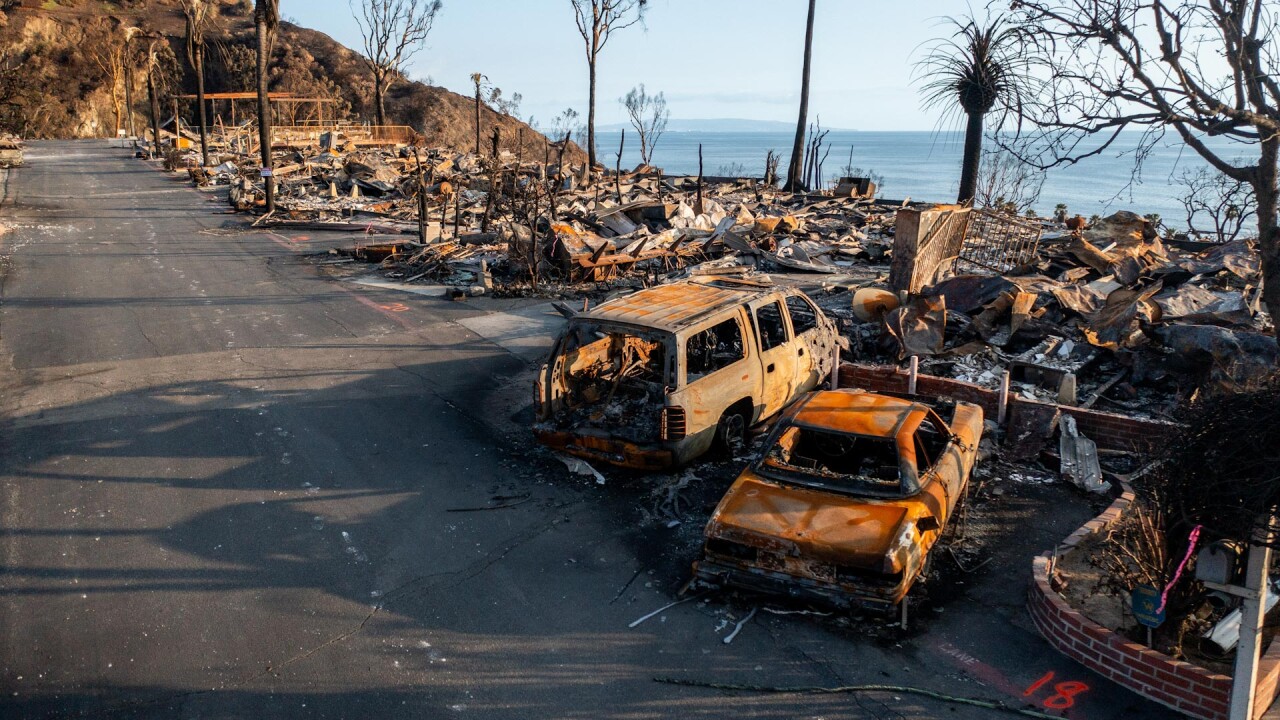Four troubled Texas continuing care retirement community financings owned by not-for-profit Emmaus Calling Inc. and its affiliates are in various stages of distress — including one in receivership — due to impacts of the COVID-19 pandemic.
All headed into the pandemic with struggles in part due to a competitive market that led to pre-pandemic rating erosion and a default for one. The pandemic
Canton II Inc.’s

S&P withdrew its ratings of
“We remain unable to obtain information from The Emmaus Calling Inc., the owner of these three projects, regarding its management policies, cash flow, and ability and willingness to pay upcoming debt service payments for the projects on Jan. 1, 2022,"
The San Antonio-based Inn at Los Patios’ ongoing covenant defaults and looming Jan. 1 default led bond trustee The Bank of New York Mellon Trust Co. NA to sue Canton II Inc. at the end of December to enforce its rights. The borrower, an affiliate of Emmaus Calling, agreed to the appointment of a property receiver and the court signed off Jan. 17.
The “borrower is actively engaged with the trustee and trustee’s counsel to determine a go-forward path on behalf of the bondholders,” says interim fourth quarter financial results posted on the Municipal Securities Rulemaking Board’s EMMA website Monday for Cardinal Bay, Stoney Brook and Glen Hope Harbor. “Borrower has engaged a financial consultant and a management consultant to review the historical and current operations of the portfolio.”
The defaults underscore the crippling blows the pandemic dealt to the continuing care retirement sector and its
“MMA’s retirement sector now accounts for half of all impairments this year (6 of 12) and 70% (7 of 10) first-time payment defaults,” Municipal Market Analytics reported in its latest Default Trends.
“Retirement was the victim of some of the most negative press stories on COVID-19’s rapid spread and death rates given the demographic it serves and the product it offers. That, along with state restrictions on these facilities and on allowable hospital procedures, contributed to a material decline in occupancy during the pandemic,” MMA said.
MMA views the sector negatively this year. “Industry experts project that it could take until almost the end of the decade for occupancy to return to its pre-pandemic level,” MMA’s Matt Fabian, partner, and Lisa Washburn, chief credit officer, said in the report. “In addition to occupancy-related revenue pressure, the sector is confronting escalating expenses from an extreme labor shortage and the rising cost of goods and operations.”
The Inn at Los Patios
The senior bonds originally carried an A rating from S&P in 2011 and the subordinate bonds a BBB. The facility’s struggles date to 2018 when the relationship “with the property manager began to deteriorate, making it difficult to maintain satisfactory results,” the sponsor Canton II Inc. reported in a January investor update.
A new property manager took over in 2019. The facility’s precipitous ratings slide began in 2019 when S&P cut the $24 million A series A-minus rating by three notches to BBB-minus, the lowest investment grade, and the $3 million B series to BB from BBB-minus.
Extreme competition in San Antonio’s senior housing market before the pandemic led management to offer discounted rents to counter growing vacancy levels across its 167 units.
The pandemic’s impact sunk occupancy and revenues while costs to buy protective equipment and cover other expenses increased. “As a result, revenue dollars were not sufficient to flow down far enough into the waterfall and fully fund operational needs,” Canton reported.
The property manager, Retirement Center Management, used its own funds and/or credit to pay the deficit.
In the fall, Canton warned of a potential bond payment default as it halted most payment transfers to the trustee, triggering events of default.
S&P in late October cut the ratings to CCC and put the rating on watch.
Canton considered a sale or refinance options but said neither were feasible in the current market. Bond trustee BNY Mellon formally notified Canton of the defaults in mid-December and Canton agreed to the consensual receivership filed by the trustee in federal court.
To preserve remaining funds for the legal action, the Jan. 1 debt service payment was withheld, according to a BNY Mellon notice.
The court approved the appointment of a property receiver Jan. 17 and a pre-trial conference hearing before Judge Elizabeth S. Chestney is scheduled for March 23.
The senior living housing project has 137 independent units and 30 assisted living.
Cardinal Bay
Cardinal Bay offered its senior living revenue bonds in four series in 2016 with the senior lien carrying an AA-minus rating, the second lien at A, the third lien at BBB-minus and a fourth unrated series. The ratings began falling in 2019 with the senior lien dropping three notches to A-minus and second lien cut by two notches to BBB-plus and the third lien affirmed.
Operational struggles lingered and the pandemic exacerbated them. “The negative outlook reflects the declining operational performance of the project over the past three years," S&P analyst Raymond Kim said in an August 2021 report when the senior lien bonds were downgraded to junk.
Beginning in November, the management company failed to forward project revenues to the trustee as required under the loan agreement which in turn triggered events of default, according to trustee Wilmington Trust NA.
The trustee opted not to make any of the $2.3 million due on the A bonds as it would “not leave sufficient funds for the protection of bondholders given the current events of default,” the notice read.
Only interest payments were due and on the B, C, and D bonds and they were made from debt service and debt service reserve accounts. About $11.5 million remains in various accounts. The trustee has hired Greenberg Traurig, LLP to represent it in connection with general matters on the bonds.
The Village is made up of eight facilities purchased with bond proceeds that offer a total of 1,037 senior-housing units in eight properties, seven in the greater Houston and South Texas markets and one in the Oklahoma City market.
Stoney Brook
Stoney Brook’s borrower 4-K Housing offered its senior living revenue bonds in four series issued in 2017 with the top tier rated A-plus by S&P, the second tier rated A-minus, and the third tier rated BBB.
In 2019, S&P cut the ratings by four to five notches due to a material drop in debt service coverage and very poor loss coverage assessments for all three classes of bonds indicating a higher likelihood that the project may fail to cover debt service should net revenue or liquidity shortfalls occur.
In April 2020, the senior bonds were the last to lose investment grade status as S&P knocked down the ratings of all three financings. The rating agency added further downgrades in August 2020.
The borrower began withholding project revenues triggering defaults under the loan agreement and bond indenture and requested that discussions with bondholders and the trustee begin.
The trustee Wilmington Trust held sufficient funds to make the full Jan. 1 payment on the A bonds but chose not to because that would deplete available funds potentially needed to deal with the defaults.
Bond proceeds financed the acquisition of three senior rental properties, branded as Stoney Brook and located in Belton, Copperas Cove, and Hewitt, with 221 units providing assisted living and memory care.
During a Jan. 7 investor call, Stoney Brook president Trey Kitchen, also president of the other three projects, said the facilities were nearly fully occupied through 2019 and meeting all fiscal obligations. Occupancy hit rock bottom in 2020 but has steadily risen and is near full.
“We are committed to preserving and rebuilding value for the bondholders and are committed to working cooperatively with the trustee to navigate a path forward in the coming weeks,” Kitchen said.
Glen Hope Harbor
Glen Hope Harbor’s 2015 issue carried an A rating. Proceeds purchased nine, standalone memory care buildings with 144 units in the San Antonio and Houston area. It headed into the pandemic in weak shape having already drawn on reserves.
S&P cut the bonds to CCC from BBB-minus in August 2019 following a draw on the debt service reserve account to pay a portion of the Aug. 1, 2019, debt service payment.
S&P cut the rating to D in 2020 after the borrower’s default on a February 2020 payment and in August 2020 withdrew the rating.
Only partial distributions were made on debt service and the latest default occurred with the Feb. 1 payment as the trustee Wilmington Trust chose to preserve remaining funds to deal with the defaults. As of January 26, the trustee holds about $1 million of funds in various accounts.
In a late December notice, the trustee notified bondholders that the management company had withheld project revenues in November and December triggering events of default and that it had demanded the borrower remedy the defaults by transferring the revenues and the company Retirement Center Management was not responsive.





